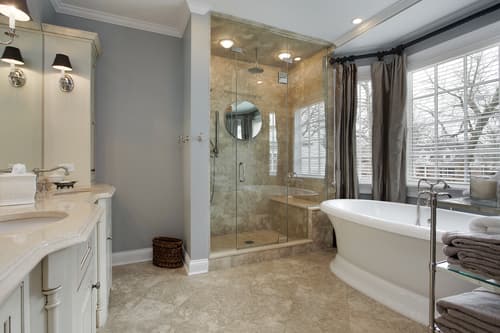4 Plumbing Noises You Never Want to Hear
When you turn on a faucet or flush your toilet, the only thing you want to hear is running water. But sometimes, your plumbing makes strange sounds. Some are easy to identify and locate, while others hide behind your wall. Each sound has a different cause—from leaks to limescale sediment—but they’re all signs that your system needs attention.
Knocking
You’ll hear a knocking in your pipes in three different instances. The first is when your water supply shuts off. This usually occurs when your washing machine is filled with water or when you flush your toilet. The knocking sound comes from water striking against a valve that’s suddenly closed. Plumbers call it the “water hammer.” While it’s not quite as mighty as Paul’s ax, it makes a noticeable sound.

Pipes are fitted with water hammer arrestors to prevent the noise. When they wear down, you’ll hear the knocking, telling you the arrestor needs replacing.
If you notice a knocking sound while your water’s running, use a gauge to check the pressure. If the pressure’s too high, reach out to a plumber. They’ll reduce the pressure or replace the valve.
When sediment builds up in your water heater, it’ll cause the heater and pipes to vibrate, creating a knocking sound you’ll hear randomly all day. By flushing the water heater, you’ll remove the sediment and the knocking will stop.
Dripping
Paul Bunyan once dripped a heavy tank of water on the land, which created the Mississippi River. However, drips in your home aren’t nearly as beautiful. Dripping sounds are signs of leaks, and they can come from anywhere.
They’ll annoy you at first but can become easy to ignore. Ignoring them wastes almost 10,000 gallons of water a year but repairing leaks quickly can save you 10% on your water bill.
If you hear a dripping sound behind the wall but can’t source it, a pipe’s leaking. If the pipe isn’t repaired or replaced, the leak will damage the wall and cause mold.
Gurgling
Gurgling sounds occur in your plumbing when water filters down your sink and shower drain or when your toilet flushes.
A build-up of dirt, food, hair, or grease can get stuck in the plumbing, causing venting issues and clogs. Water will drain slower and air bubbles won’t get expelled through the nearest vent. Instead, the bubbles will create a gurgling sound.
In some cases, tree roots can break the sewer line. Without proper drainage for wastewater, the gurgling bubbles will create bad odors in the drains of your home.
Whining
If you hear a whining noise, check the plumbing throughout your home. The whining could be isolated to the kitchen or the bathroom or it may affect the entire house. Regardless of where they’re occurring, whining sounds need to be addressed by professionals.
Water pressure is initially very high until it reaches the valve. By easing the pressure, the pipes, fittings, and joints last longer and take less damage.
Pressure-reducing valves are usually made of either brass or iron. While strong, they’ll wear out over time, causing the whining. When the valves wear out, water pressure will increase. If the whining is ignored, leaks will sprout in the fitting and joints. Eventually, the affected pipes will burst.
Replacing the pressure-reducing valve as soon as you hear the whine will help you avoid costly repairs in the future.
If you’re hearing strange sounds coming from your plumbing, our team is ready to identify and fix the issue. We share Paul Bunyan’s tenacity and desire to help people whenever they need it. To make an appointment, call us at (612)-340-1444.


